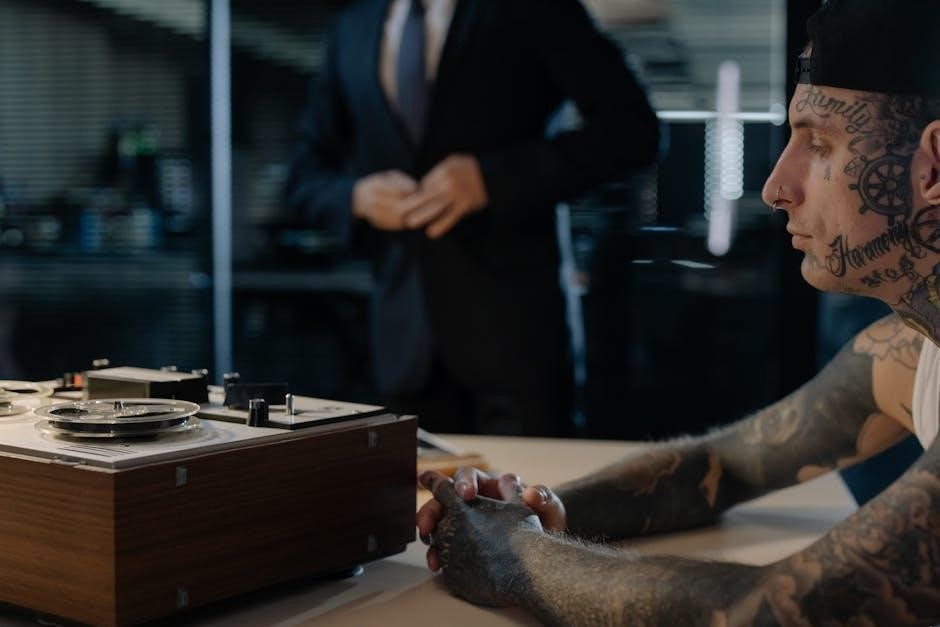
Preparing for a paralegal interview requires thorough research and practice. This guide provides essential insights, common questions, and expert tips to help you excel and land your dream role.
The Importance of Research and Preparation
Research and preparation are crucial for acing a paralegal interview. Understanding the firm’s values, practices, and expectations helps tailor your responses; Reviewing common questions and practicing answers ensures confidence. Familiarizing yourself with legal procedures, document management, and ethical standards is essential. Preparation also involves organizing your thoughts on past experiences, showcasing skills like organization and problem-solving. Utilizing downloadable PDF resources and practice tools enhances readiness. By dedicating time to research, you demonstrate professionalism and a genuine interest in the role, setting yourself apart from other candidates.
Preparation builds confidence and highlights your ability to think critically. It ensures you can articulate your qualifications clearly and address potential challenges effectively. Employers value candidates who are well-prepared, as it reflects your commitment to excellence and readiness to contribute to their team. Researching the firm and practicing responses creates a solid foundation for a successful interview.

Common Paralegal Interview Questions and Answers
Paralegal interviews often include questions about responsibilities, skills, and experiences. Common topics range from organizational abilities to handling deadlines, ensuring accuracy, and legal knowledge.
Overview of Frequently Asked Questions
Paralegal interviews often include a mix of background, behavioral, and situational questions. Common topics range from understanding your motivation for becoming a paralegal to your ability to handle deadlines and maintain accuracy. Questions may also focus on your organizational skills, legal knowledge, and how you manage multiple tasks in a fast-paced environment. Additionally, employers may ask about your experience with legal software, document preparation, and research techniques. Behavioral questions, such as how you handle stress or conflicts, are also common. Reviewing the job description and practicing responses using the STAR method can help you provide clear, structured answers during the interview.
Essential Skills for Paralegals
Key skills include organization, research, analytical and writing abilities, attention to detail, communication, judgment, and confidentiality. These are crucial for success in a paralegal role.
Key Skills Required for the Role
Paralegals need strong organizational and time management skills to handle multiple tasks efficiently. Proficiency in legal research, analytical thinking, and drafting documents is essential. Attention to detail ensures accuracy in legal paperwork. Effective communication skills, both written and verbal, are critical for collaborating with attorneys and clients. Problem-solving abilities and judgment are vital for navigating complex legal scenarios. Additionally, paralegals must maintain confidentiality and demonstrate patience and persistence in high-pressure environments. These skills collectively enable paralegals to support legal teams effectively and contribute to case success.

Behavioral and Situational Questions
Behavioral questions assess how you handle real-world scenarios, such as managing deadlines or conflicts. Situational questions predict your actions in hypothetical legal environments, testing problem-solving and organizational skills.
Examples and Answering Techniques
Behavioral questions often ask for specific examples from your past, such as handling tight deadlines or resolving conflicts. For instance, “Describe a time you organized a large volume of data under pressure.” Use the STAR method to answer: Situation, Task, Action, Result. Situational questions, like “How would you manage multiple deadlines?” require clear, logical responses. Practice answering common scenarios, such as maintaining confidentiality or prioritizing tasks. Demonstrate problem-solving skills and professionalism. Research common questions and prepare thoughtful answers to showcase your capabilities and fit for the role.

Red Flags and Common Mistakes
Avoid appearing unprepared or disorganized. Common mistakes include failing to research the firm, lacking answers to basic questions, and showing poor time management skills.
Red flags for employers include negative comments about previous jobs, lack of professionalism, and unclear career goals. Ensure your responses reflect positivity and focus.
What to Avoid During the Interview
Avoid negative comments about past employers or colleagues, as this raises concerns about professionalism. Being unprepared for common questions or lacking knowledge about the firm can harm your chances. Displaying poor time management skills or disorganization is also a red flag. Overly casual behavior or unrealistic salary expectations may deter employers. Additionally, avoid appearing disinterested or lacking enthusiasm for the role. Negative body language, such as poor eye contact, can create a bad impression. Lastly, avoid discussing sensitive topics like law school plans if unrelated to the position. These mistakes can undermine your credibility and professionalism.

Body Language and Communication
Maintaining positive body language and clear communication is crucial. Ensure good eye contact, use open gestures, and smile to show confidence. Speak clearly and concisely, avoiding filler words.
Non-Verbal Cues and Effective Communication
Non-verbal cues and effective communication are critical during a paralegal interview. Maintain good posture, use open gestures, and ensure consistent eye contact to project confidence. Smile naturally and avoid fidgeting, as these actions convey professionalism. Speak clearly, enunciating your words, and modulate your tone to show enthusiasm. Active listening is equally important—nod to show engagement and avoid interrupting. Mirroring the interviewer’s body language subtly can build rapport. These non-verbal signals, combined with articulate responses, demonstrate your readiness to thrive in a legal environment and leave a lasting positive impression.

Salary Negotiation and Benefits
Discussing compensation confidently showcases professionalism. Highlight your qualifications and research industry standards to negotiate effectively. Clarify benefits and align them with your career goals.
Tips for Discussing Compensation
When discussing compensation, research industry standards to set realistic expectations. Highlight your qualifications and align your request with the role’s demands. Be confident yet respectful, ensuring your ask reflects your value. Consider non-monetary benefits like flexible hours or professional development opportunities. Avoid making the first offer; instead, let the employer propose a starting point. If unsure, ask for time to review the package. Remember, negotiation is a conversation, not a confrontation. Use silence strategically after making your request. These strategies will help you advocate for fair compensation while maintaining professionalism.

Thank-You Notes and Follow-Up
Sending a timely thank-you note after your interview shows gratitude and reiterates your interest in the role. Keep it sincere and concise to leave a positive impression.
Importance and How to Write Them
Thank-you notes are crucial for leaving a lasting impression after an interview. They demonstrate professionalism and gratitude, setting you apart from other candidates. To craft an effective note, express sincere appreciation for the opportunity, highlight key discussion points, and reaffirm your interest in the role. Keep the tone professional yet personable, ensuring clarity and brevity. Sending it within 24 hours post-interview is ideal. Tailor each note to the specific conversation, reflecting on how your skills align with the firm’s needs. This thoughtful gesture can significantly influence the interviewer’s final decision, showcasing your commitment and enthusiasm for the position;
Downloadable PDF Resources
Access comprehensive guides, sample questions, and expert answers in downloadable PDF formats. These resources offer convenient preparation, covering essential topics and tips for paralegal interviews.
Benefits and Where to Find Them
Downloadable PDF resources offer unparalleled convenience, providing structured lists of paralegal interview questions and answers. These guides are portable, accessible offline, and ideal for organized study. Many PDFs include expert tips, sample responses, and strategies to enhance preparation; They often cover a wide range of topics, from behavioral to situational questions, ensuring comprehensive readiness. Additionally, some PDFs offer interactive elements like practice tests. To find these resources, explore legal education websites, career platforms, or professional paralegal associations. Websites like paralegal.com or legal career blogs frequently provide free or premium downloadable materials tailored for interview success.

Interview Simulators and Practice Tools
AI-powered interview simulators mimic real-world scenarios, offering feedback on responses. These tools enhance preparation, build confidence, and refine communication skills for paralegal interviews.
Enhancing Preparation with Technology
AI-powered interview simulators and practice tools revolutionize paralegal interview preparation. These platforms simulate real-world interview scenarios, allowing candidates to practice responses and receive instant feedback. Many tools offer access to downloadable PDF resources, including common questions and answers, to prepare on the go. Advanced features like speech analysis and performance tracking help refine communication skills and build confidence. By leveraging technology, aspiring paralegals can gain a competitive edge, ensuring they are well-prepared for any interview situation. These tools are especially useful for rehearsing behavioral and situational questions, enabling candidates to deliver polished, professional responses.

Final Tips for Success
Build confidence by practicing answers, showcasing professionalism, and demonstrating passion for the role. Highlight organizational, communication, and attention-to-detail skills to leave a lasting impression.
Building Confidence and Professionalism
Confidence and professionalism are key to acing a paralegal interview. Research the firm thoroughly to understand its values and practice answering common questions. Use the STAR method for behavioral queries, showcasing your skills and experiences. Dress professionally, maintain eye contact, and use positive body language to leave a strong impression. Be prepared to discuss your strengths, such as organizational and communication skills, and demonstrate enthusiasm for the role. Confidence comes from preparation, so review your qualifications and practice articulating your value. Professionalism is evident in your demeanor, attire, and thoughtful responses, ensuring you stand out as a capable candidate.
Acing a paralegal interview requires preparation, confidence, and professionalism. By researching common questions, practicing responses, and showcasing your skills, you can make a lasting impression and secure the role.
Summarizing Key Points for Acing the Interview
To excel in your paralegal interview, focus on researching common questions, organizing your thoughts, and showcasing your skills. Highlight your organizational abilities, attention to detail, and legal knowledge. Practice answering behavioral and situational questions using the STAR method to demonstrate problem-solving and professionalism. Show enthusiasm for the role and align your goals with the firm’s values. Avoid negative remarks and emphasize your commitment to confidentiality and teamwork. Utilize downloadable PDF resources and interview simulators for tailored preparation. Stay calm, maintain positive body language, and follow up with a thank-you note. Confidence and preparation are key to making a lasting impression.